Life in 815 Squadron, HMS Illustrious and beyond. |
|
By Richard Griffin, R.N. (1921-1999) |
|
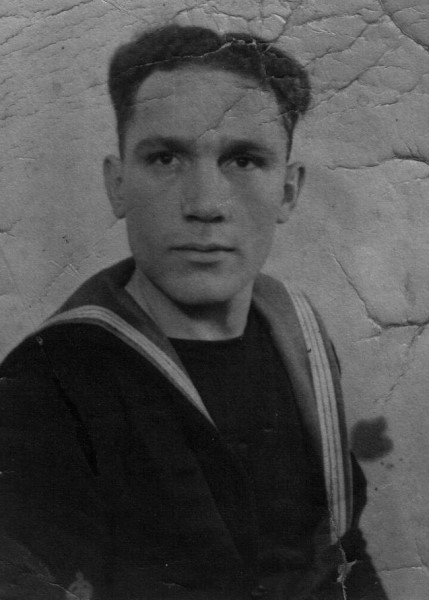 |
A clever, kind and loving husband, father and grandfather. Richard Griffin, R.N. (1921-1999)
|
I joined the Royal Navy as a youth in January 1939. The navy at the time was about to start replacing Royal Air Force personal then serving on HM ships, with newly trained naval ratings. I volunteered for this new Air branch as an Air mechanic [O], which stands for Short Service Flying division. My official number was S.F.X.5, which made me the fifth person to join. One day it was decided that there was enough wind to operate the aircraft whilst anchored in harbour. Fine - then the wind dropped. All the Swordfish managed to land back on OK, but of the Fairy Fulmers [fighters], one tore out its arrester hook and went over the side, one crash landed on the golf course and one went somewhere else, but where I can't recall. It was all quite relaxed. The sun was warm, we were wearing our tropical whites, there were a couple of runs ashore in Hamilton, and the war seemed a long way off. Captain Boyd cleared the lower deck, and gave a little pep talk in which he expressed the view that he was looking forward to seeing bombs bounce off our 4 inch armoured deck. A bit prophetic that . Only they didn't bounce. |
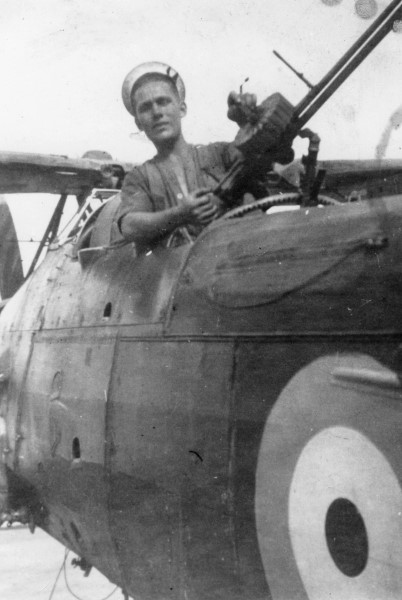 |
Richard Griffin seen in a Swordfish aircraft.
|
It was a makeshift landing strip in the desert. I had no clothes. I remember sleeping under the stars that first night. Boy it was cold with dung beetles, sand and scorpions for company. Still it was good fun for all that. He was really puzzled and upset. The rest of us were busy packing kit and put it down to too much beer.
|
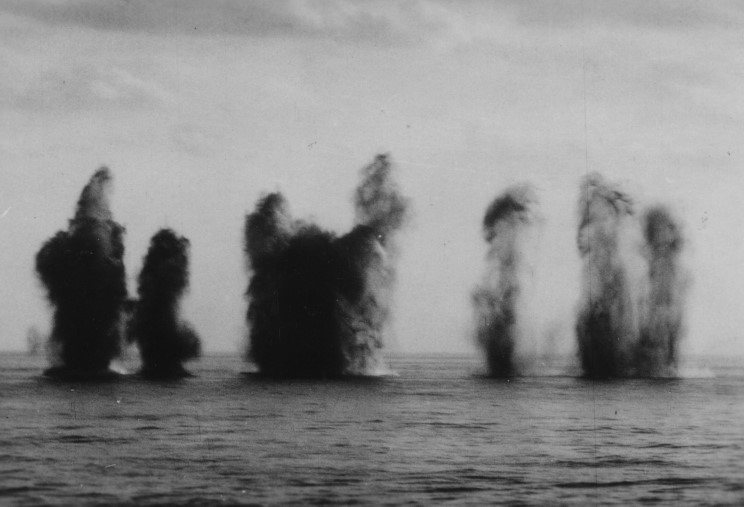 |
| Some of the bombs "happily exploding between the ships" in 1940.
|
We had to fly anti-submarine patrols all hours of daylight, so we were kept busy. When we were off watch we could exercise, smoke, relax and so on by walking up and down the flight deck, which was over 850ft long. Sometimes when the ship returned to Alexandria, the air division remained on board or flew off to Dakahlia depending I suppose on operations. In November 1940 we sailed as usual, and about this time we flew on board six Swordfish from HMS Eagle. Something was on. We learned that the air group was to attack the Italian naval base at Taranto, and we were soon busy getting as many aircraft as possible serviceable. All the ammunition was brought up from the magazine, plus torpedoes and bombs and extra planes were on board. It was pretty crowded. We worked 18-20 hours a day to get it all ready. Then on the night of Nov 11th one by one off they flew. It was a dark night with no moon, the ship cruised some 200 miles from Taranto, and we all waited anxiously. Then after a couple of hours came the first roar of a Pegasus engine, then another. Finally all had returned but two; one of these being Lt. Commander Williamson C.O. of 815 squadron. The next morning we were elated when RAF reconnaissance showed one battleship sunk, two more heavily damaged, and other damage. This was what we had joined for, but later there was a price to be paid. I remember standing in the well deck, a gray sea surging past. There seemed to be an eerie still air over the ship. I have often thought about that since ... Fear? Premonition? I know I had a very strange feeling.
|
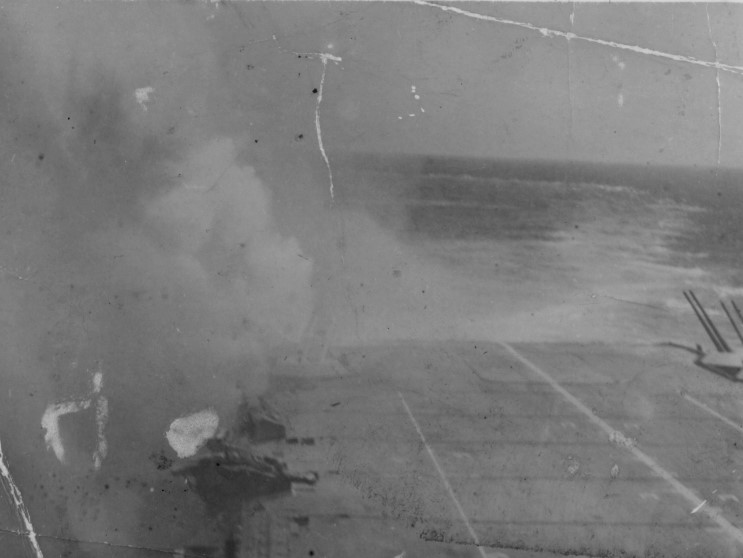 |
| HMS Illustrious burning after a direct hit.
|
Illustrious was armed with 16 4.5 dual purpose guns, and 8 6 barrelled 2lb quick firing AA weapons. The ship kept jumping and shaking. Several large bombs hit the shop aft, and the after hanger was on fire. The noise was indescribable. In my baptism of fire, all that sticks in my mind are impressions. I was standing more or less in the centre of the hanger. A chap came down from the flight deck; his rubber suit was full of holes with blood leaking from all of them. I helped carry him down to the casualty station in the washroom flats. The surgeons were busy. Blood washed from side to side with the sway of the ship. I returned to my action station in the hangar. The ship continued to rock and sway. I looked up with fear and apprehension. Then there was an almighty flash as a 1,000 lb bomb pierced the 4 inch armoured deck and exploded. I was only aware of a great wind, and bits of aircraft, debris, all blowing out to the forward lift shaft of 300 tons, which was also blown out. There were dead and wounded all around. My overalls were blown off and I had small wounds to the back of my head and shoulder. I was probably 10-15 feet away from the bomb when it exploded. Luck I survived? I prefer the thought of someone looking out for me. The hanger by then was burning all over. The ships commander came and said, 'come on lads close the armoured doors.' The overhead sprays then flooded the hanger.
|
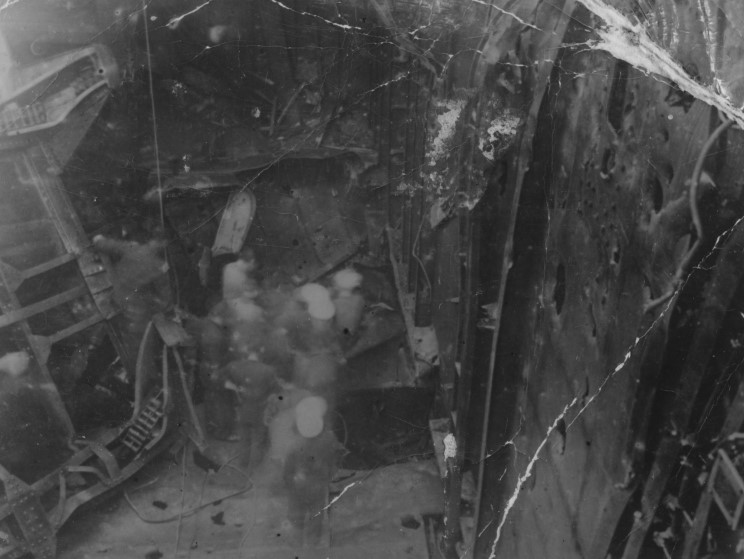 |
| Damage to the aft aircraft lift on HMS Illustrious.
|
The ship started to sink by the stern, and everyone had to blow up lifebelts. Then came a spot of humour in all that chaos. Poor old Corporal Gater came through a side door white as a sheet saying 'I wish I hadn't bloody joined.' The battering carried on for six to seven hours. There were many wounded piled up. The aft surgeons station had been destroyed, and the forward station was unable to cope quickly with so many casualties. The next morning we cleared lower deck, and a roll call was taken. An announcement on the tannoy ordered in case of further attacks on the ship, all hands other than gun crews etc. should go over the side, and into the big caves in the hillside. No sooner said than over the enemy came again, so over the side we went! There were three aircraft in the air when Illustrious was damaged, but there were some spares at Dakahlia, some were sent from the UK, and we were soon fully operational. My last memory of Illustrious was clearing lower deck and lining the ship's side to pay a last salute to the destroyer carrying our dead to sea for burial. Lines of white ensigns lay row upon row. The crew were at attention as we were. Words are still inadequate. |
Once again back in Dakahlia we were soon in the swing. Dakahlia was the old Egyptian Airline field; there was a large hangar a mess hall, canteen and a few other buildings. There was no living accommodation and we lived in tents, which we dug in to protect against possible air attack. The air was warm, and the field bordered on the bay of Alexandria, so it was a pleasant enough location.
|
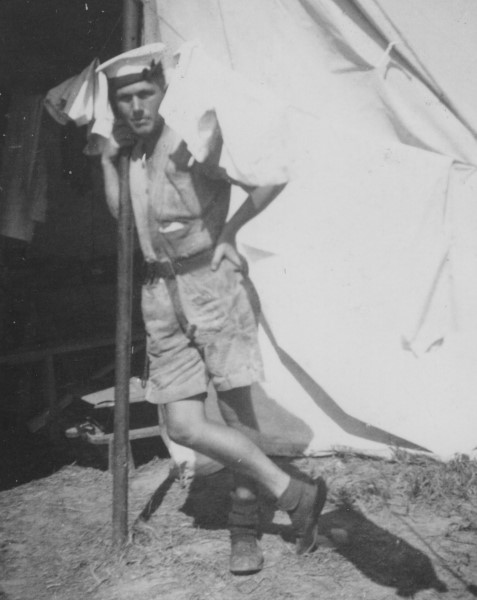 |
Richard Griffin in Dakahlia, Egypt 1941.
|
There were occasional raids on the fleet in Alexandria. There was an AA battery at Agamy Point adjacent to the camp and this made an awful clatter at times but it was more noisy than dangerous. After a little while, we had orders to move to Cyprus to operate against the Vichy French. Some of us flew in an old Bombay Bomber. We located at Nicosia civilian airfield. Apart from a contingent of Green Howard's, we were the only English on the island. We were accommodated in a 1st class hotel in Nicosia each with en-suite bathroom and shower, it was like being on holiday. The meals were a little exotic too: roast pigeon with stuffed cucumber etc. When we arrived at first, an old RAF corporal appeared from somewhere bearing a large map and after the officers duly studied this with a bit of a confab, a number of Cypriot workmen arrived and proceeded to dig at X marks the spot ! Then lo and behold, up came 250 lb bombs and other clutter, the only snag being that this magazine was all WW1 vintage and had probably been there ever since. The bombs were all MK 1 GP. They had a hollow tube through the middle and needed a special arrangement of exploders and detonators to prime them for use. No one had a clue what to do with them - that is except me. I remembered one of the old army instructors at the training school at Eastchurch describing these types and we had taken down all the details. I had kept all my notes and they were in my kit over at Alexandria, so I was flown over to pick them up and subsequently we were able to assemble the armament as required. We were operating against the Vichy French forces in Syria, Lebanon and other targets within range of our Swordfish. One time we had orders to locate and destroy a ship in the area that mustn't reach it's destination. Eventually it was located inside a Turkish port and one of our planes attacked it there but I believe the torpedo ran on in to the town causing a bit of mayhem. I wonder if that little episode ever found it 's way into the history books?
|
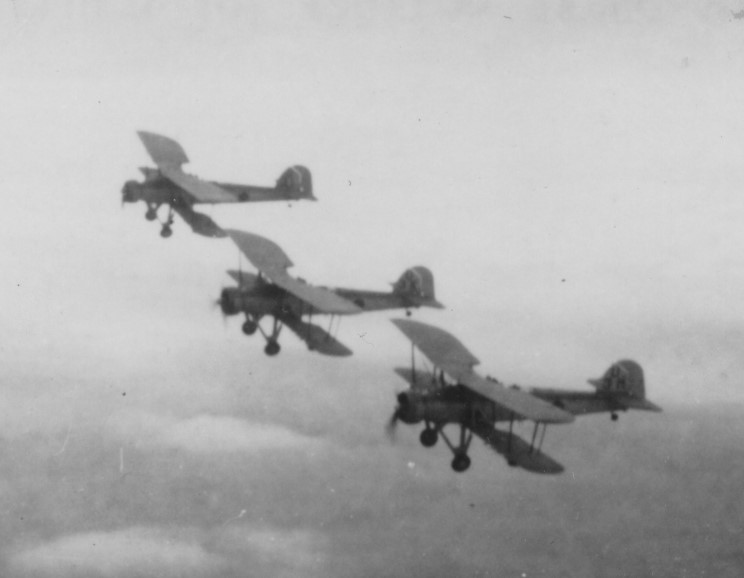 |
| Swordfish from 815 Squadron. Tail numbers (from top to bottom): D3J, D3K and D3M.
|
After a little while air attacks on Nicosia air field caused us to be moved to an emergency field in the olive groves near Limasol where we set up our own tented camp. There were no facilities, we lived on tinned rations but there was plenty of water, the weather warm and sunny. Quite a pleasant way to run a war. There were no places to visit ashore but we did manage to visit the local cafe from time to time and partake of the local brew. As always we had orders to move; went down to Famagusta to board a navy sloop. Leaning over the side was my old mate Arthur who I joined up with. That was good for a tot or two of rum below. We lost a plane or two on Cyprus, other wise it was a fairly quiet interlude apart from one of the nights it was my turn to stand guard. Aircraft were sited around half a mile from our tented accommodation. They were dispersed around the perimeter of the field in sandbagged bays. The routine was to have a patrol throughout the night around the airfield. On the night it was my turn for duty I was a leading hand and in charge of the watch. I elected myself to the midnight watch 12-4 am. Some time during the watch I was sitting on an oil drum thinking of nothing in particular, when away in the distance from the direction or our tents came the sound of footsteps. It occurred to me that this was one of the officers coming to check out the sentries, so I got ready to show him I was on the ball. On came the footsteps at a steady pace. It was a brilliant moonlit night you could read a newspaper. I peered, the steps were like boots on tarmac, yet there were only dirt paths! The steps come closer, I couldn't see anything then suddenly they turned and came towards me, coming it seemed quite close. I was by this time, apprehensive. I shouted 'Halt who goes there?' no answer, there was no one to be seen. I challenged again, the footsteps seemed almost upon me 'Halt or I fire!' Feeling a bit stupid I opened fire, all 5 rounds in the mag. The steps came up to me - through me - and disappeared in the distance. A voice in the distance shouted 'No one's here.' I didn't know of any other units around, none of my watch or anyone else heard a thing. To this day I still don 't know whether it was an hallucination. Back at Dakahlia we were soon organized; since we were in support of the desert army we traveled up and down all the time operating against submarines and surface craft. I think through all the campaigns we sank some 150,000 tons of enemy shipping. Quite a bagful. The first place we settled at was Mersa Bagush, about a 150 miles west from Alexandria, the Cyrianatian desert wasn't big rolling dunes, it was sand and dust on rocky ground with some sparse vegetation intermingled. Occasionally when the Khamsine wind blew it was pretty hellish for the dust got into all the body orifices and smothered everything and made difficulties for keeping the aircraft weapons in good trim. When we first arrived the water wells had been poisoned and water had to come up from Alexandria by tanker. We were only allowed 1/2 pint of water a day each and that went into the communal mess for tea and cooking. However the Italians had had a good supply of bottled Vichy mineral water and as there was a fair bit of this kicking around it made things a bit easier. We used to clean our teeth in it but we were unable to wash or clean our clothes. Food was all tinned, even Huntley & Palmers hard tack biscuits. Still, there was tinned bacon, tinned fish & chips, we did alright. We were plagued with flies, fleas, scorpions, huge centipedes and camel ticks which we had to burn out with a cigarette. All the same, it was a free and easy existence, our only clothing a pair of shorts and of course the lovely warm sun. It was at Mersa one day; I was in the cook's tent getting a lecture on how to make scrambled eggs from our cook, who in civilian life had been a chef in the Savoy hotel in London. All of a sudden came a terrific commotion, we dashed outside, there were German Messerschmitts all over the place shooting up planes, tents and everything else. There were planes on fire and blokes diving all over the place; the cook and me did a hasty scarper into the nearest slit trench until it was all over, just like on the telly. This raid was a bit unusual, the German lines at that time were a long way to the west, but these jokers had fitted long range fuel tanks to give them the range. We were always kept busy, I don't ever remember being bored, a great adventure really.
|
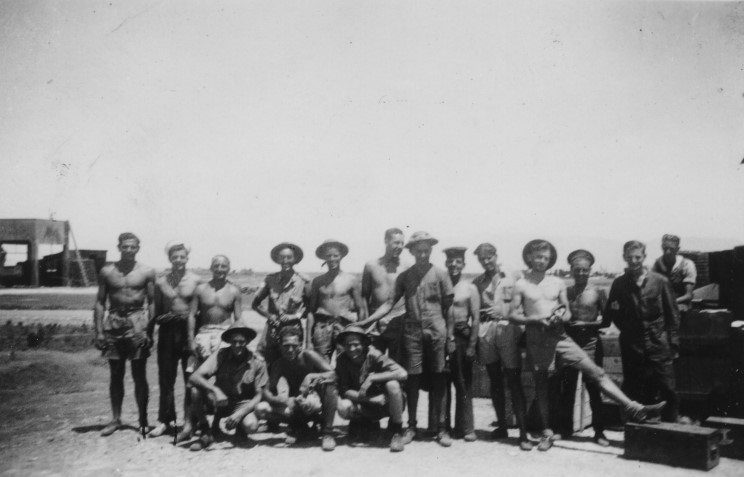 |
| 815 Squadron at Mersa Bagush in 1942.
|
The next air strip on was Bagush. Same set up, sand and scrub. We were there for a little while; the first thing we did at a new location was to dig a slit trench near where we lived and worked as there was always the risk of enemy planes diving in from nowhere. At Bagush, I decided one time to have a go at them. I carefully dug a deep gun pit, and erected a gun mount fitted with twin Vickers Mk quick firing guns from one of the planes and made up the ammo with tracer incendiary and armour piercing bullets. 'Ha' I thought 'that will give the bastards something to think about.' Well - the next night there was an air raid. Out I dashed to have a moment of glory... my gun emplacement was crammed full of bodies cowering from the raid. I shouted and hollered but not a one would shift, so I had to find another hole to dive in. Another night at Bagush, there was a severe raid going on against another airfield a few miles up the coast. We had three Swordfish due to land from that patrol. The routine was for the flare path to be briefly switched on then our job was to hop out and guide the aircraft to it's dispersal point. This night as soon as the flare path came on, the enemy aircraft up the road decided to have a go down our way. I was out on the runway to guide my plane in when all hell broke loose, bombs bursting everywhere, really pretty too, just like a huge firework. A bit of quick dashing about then I can tell you. When the Germans were invading Greece, we were sent there to a small airfield just outside Athens. At first this was pleasant, we were able to have a couple of runs ashore in Athens. In fact I met a nice Greek girl, another budding romance. Well not quite.... the Germans invaded. I had no luck! Just before we left I was ashore with a couple of opos. We had a hotel room for the night. During the night, there was this almighty bang, huge cracks appeared in the walls, furniture fell all over the place. We made a big beeline down to the cellars serving as an air raid shelter. I was impressed by the stoicism of the Greeks. There had been an air raid on the Piarreas [ Port of Athens ] that night and they had hit an ammunition ship, the train loading ammunition along the quay had also been hit and was on fire. These two had exploded causing the big bang. The port was an absolute shambles. A few days later, we evacuated and saw all this, witness to the somber faces of the populace who knew what we were leaving them to.
From Greece, we boarded a little steamer and traveled down to Crete. That had a somber atmosphere. We landed at Suda Bay. The old cruiser York was sunk in the harbour from air attack, her guns sticking up out of the water. There was this long jetty, where we disembarked. A wizened old Chief Petty Officer came up and said "there's two sorts here lads, the quick and the dead so you better be bloody quick". Quite a welcome! One time we moved up to Derna, a little town there quite deserted of course and ransacked where the armies had passed through. There was an airfield close to a little bay and we operated from there. The gear laying around was unbelievable, weapons, uniforms, etc. A good time was had by all. Plenty of firing at all sorts of targets, no drinking water, no water to wash with, we were a crummy lot. The problem with all the Italian camps were the fleas, big and black and hungry. If you poked your head into an abandoned tent or wherever there was a zzzzzzzzzzzzz as these blighters descended on you. There were several large wooden huts around, so we were able to use these as living quarters. Also in the huts were several very large vats of red wine; manna from heaven. By drinking enough of this brew at night it was possible to get off to sleep without suffering from flea itch too much. Otherwise it was a blanket over the head and decimate the blighters with a lighted candle. We were in Bagush when Montgomery 's 8th Army began the big retreat from Tobruk. The coastal road ran by the airfield and for days we watched this huge column of troops and all the other paraphernalia of war moving along the road. We had orders to pack the lorries; we put demolition charges in the ammo dump gradually the line on the road petered out. The C.O. was waiting for orders to move out and fly the aircraft off while groups of tanks squared up and started firing. Eventually we got the order to go and we got onto the road and started back to Dekhalia. Quite a journey that was, groups of soldiers burying their mates by the roadside, wrecks and gear cluttered the roadside. I saw a poor old dog dragging its hind legs behind him. All the detritus of a retreating army. We got to Fuka, which was a huge re-fueling dump; there were about 20,000 vehicles waiting to refuel, it was fortunate the Germans had no air power or there would have been mayhem. We arrived back in Dakahlia to scenes of panic, guns were being dug in around the air field perimeter, all the buildings had been evacuated, gear scattered everywhere. 'The Germans are just up the road, "they said" well, "we've just come 200 miles and didn't see them" we said but pretty soon they were at El Alamain and the next bit we were flat out. Swordfish would carry 6,250 lb. bombs and we were busy dawn till dusk arming the loading the planes. The front was only a few miles up the road, it was a quick turn around. As soon as the army advanced we followed, eventually the army advanced past Tobruk, past Benghazi and things became fairly stable. After 6 months in the desert you were sent back to Dakahlia to be de-loused. Scabies crabs and ticks being the worst problems. Then you were due for a two week leave in Cairo.
|
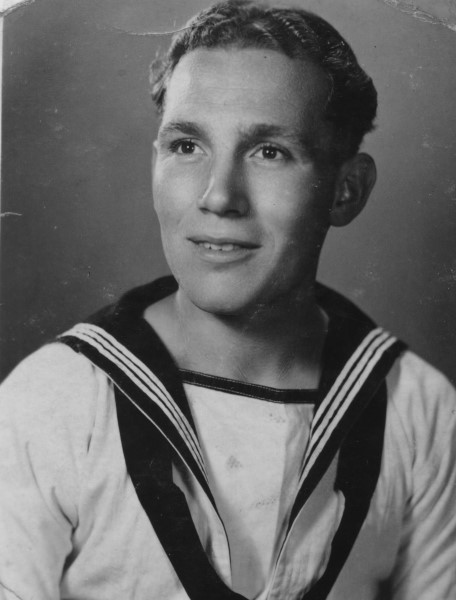 |
Richard Griffin in Cairo, Egypt 1942.
|
I had a fortnight in Cairo but I can 't remember a thing about it. There can be some awful gaps in memory. I remember one early morning I had to fly in an old Australian Walrus push propeller aircraft. I had only had time for a weak cup of tea and I was violently air sick but I can't remember where I went or why........strange. By the end of 1942 all the original squadron ratings had been drafted back to the UK and of the ones who had started at Worthy Down I was the only one remaining. By that time, I was rated to Acting Petty Officer and it was my turn to come home. I went to Port Said and took passage on an old cargo vessel the SS Destro through the Suez Canal, down the Red Sea. We called in at Cape Town. Once back in England, I took an air gunnery course at Whale Island, I went to Dunfermline, joined 1850 Squadron, then went to Jacksonville, Florida to train on corsair fighter bombers. Came back to the UK and embarked on the light aircraft carrier Venerable. After a short while, we transferred to Vengeance. We then sailed to join Indomitable, Glory and Colossus to form the 11th Aircraft carrier squadron. We sailed to Malta, arriving there on VE day 1945. From there to join the British Pacific Fleet via India, we were only a short time in Sydney, Australia when the atom bomb on Hiroshima ended the war. Indomitable and Vengeance then sailed to Hong Kong. Admiral Harcourt on Indomitable gave the Japanese 24 hours to surrender. He took over as Governor, then Indomitable sailed off to other climes leaving Vengeance to take control of the Island.
|
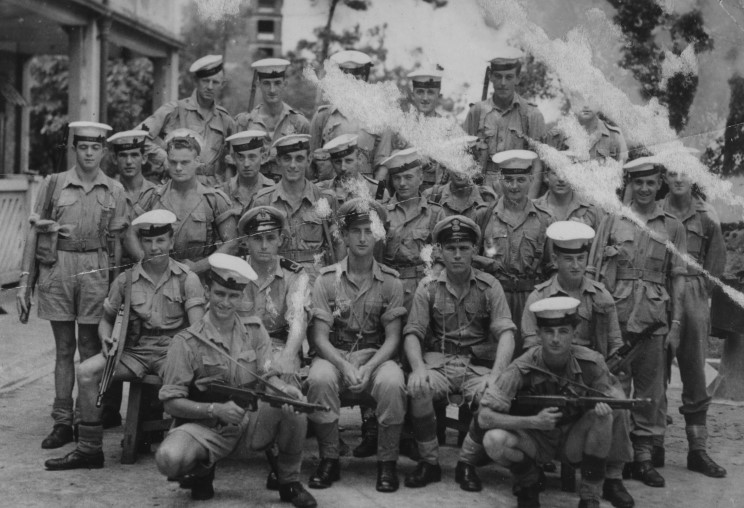 |
| 4th Platoon from HMS Vengeance in Hong Kong 1945.
|
We formed a company of four platoons of armed sailors. Being a P.O. Gunners mate, I was in charge of 4 platoon of 24 sailors and we had the job of taking over and securing Victoria Barracks the old British H.Q. After clearing up there, we moved to Kowloon the mainland taking charge of some 2,000 Japanese Prisoners of war who had voluntarily shut themselves into the prisoner of war camps, to protect themselves against Chinese bandits who were roaming around. Whilst in Victoria barracks I used to set a watch from my platoon around the perimeter of what was a very large area. One night my officer and myself were wandering around when we came across a quite large circular building with a typical Chinese roof. It was boarded up and surrounded by masses of barbed wire. No way in at all. My officer, [I can 't recall his name] and I decided it was our duty to investigate this. Eventually we made an entrance through all the obstacles and got into the building. Lo and Behold ! it was an Aladdin's cave stacked from floor to ceiling with wonderful Oriental ceramics etc. Well, he and I decided to take a souvenir and before long word got around and others started to help themselves. Eventually the Governor put a stop to what was really looting. Anyway, the only thing I had taken away was a large Chinese vase highly decorated. I went from China to Sydney, then to Freemantle and embarked on the SS Britannic to travel back to the UK. Two days out from Bombay and an artificer with whom I had shared a mess with on Vengeance contracted Smallpox. The poor chap was shut away in a temporary hut on the forecastle. He eventually died. The rest of us were battened down below, vaccinated and only allowed out when we arrived in Liverpool. |
Richard Griffin, R.N. (815 Squadron) © Richard Griffin all rights reserved |
(Daughter's note) Dad went mad and arranged for the doctor to call and give us both a jab. He came and duly scratched our arm with the vaccination. Dad asked 'How much?' - pre National Health days - while drawing a five pound note from his wallet. The doctor reached across and deftly whipped the note from dad's hand saying, 'That'll do nicely, good morning,' and left before dads mouth had finished saying 'much'. |
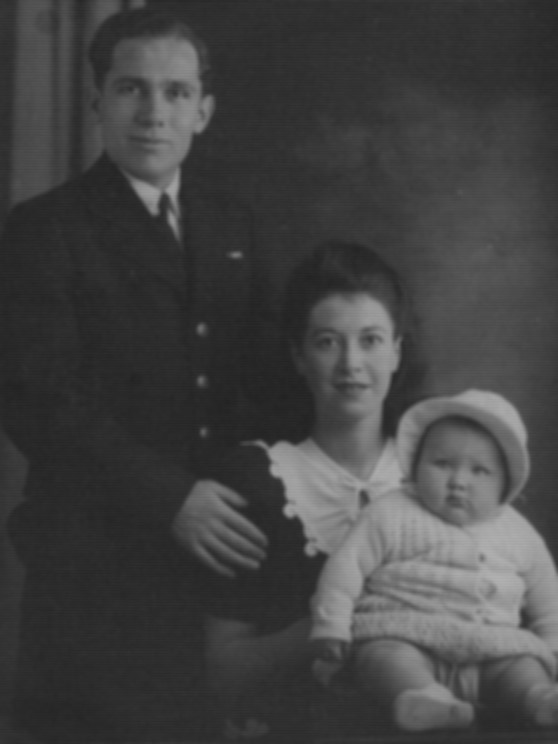 |
Richard Griffin and family.
|
I badgered my dad Richard to get some of his memories of his time in the Fleet Air Arm written down before they were lost forever. Sadly there was much he'd forgotten. But by writing down what he did recall, suddenly, names and event became far clearer, so I'm glad I pushed and hope he forgives me! I've corrected some punctuation. Everything else is as he remembered and wrote himself. He was proud of the part he played in the war; proud of the Navy and proud of the Fleet Air Arm. He served on many ships as well as Illustrious and on his discharge had risen to the rank of CPO, but Illustrious was always his favourite. |
Di Rayburn, August 2007 |
Page published Dec. 10, 2007 |